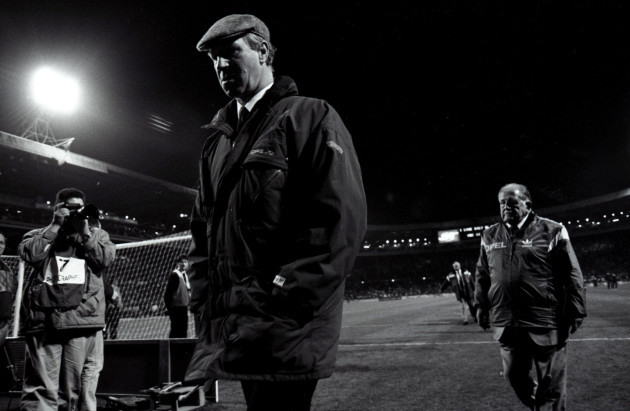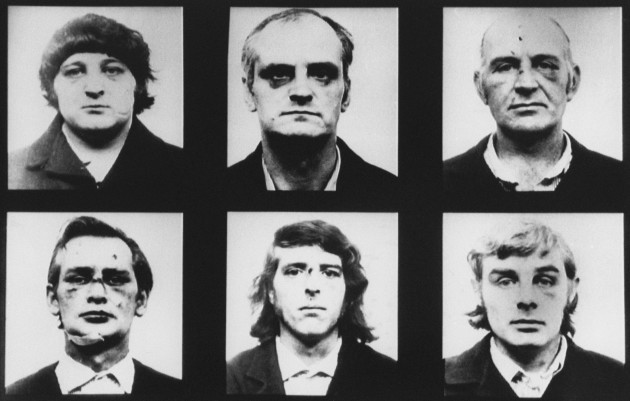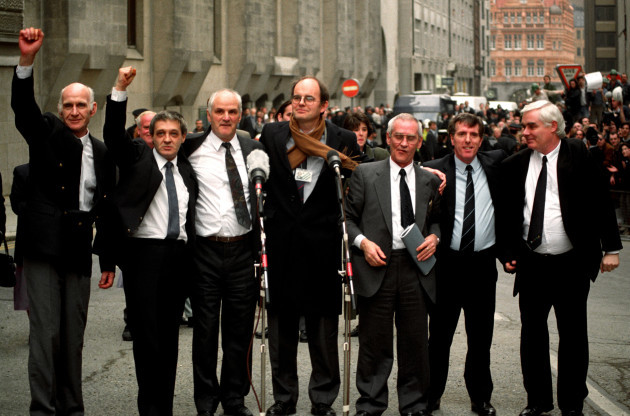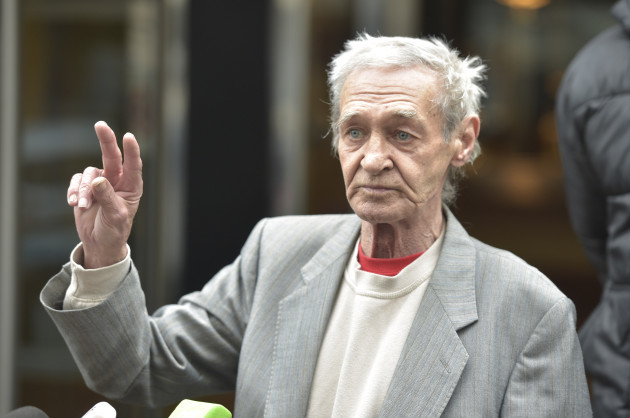LIFE IS TANGLED and contested and our stories are rarely neat: this was the lesson of England and Ireland’s 1-1 draw at Wembley in 1991.
Jack Charlton’s Irish team were successful but freighted with more meaning than most football teams have ever been: styled as emblems of a new Ireland in which the world could see the tricolour flown in benign and friendly hands.
The truth of that mythmaking remains open to debate, but Wembley ’91 proved these stories we told ourselves about that Irish team weren’t read widely elsewhere.
If we were moving on from the past, then some of those around us weren’t quite ready.
The day began with 200 English fans attacking Irish supporters drinking in the Black Lion pub, a clash which left five injured and eight arrested.
Charlton, meanwhile, was returning to the turf on which he won England’s only World Cup but was barracked and booed, assailing by chants of “Judas.”
He was deeply hurt, muttering to Tony Cascarino in grievance on his way off, “‘I won the World Cup for this country.”
High in the stands, Paddy Hill was supposed to be enjoying his first fortnight of notional freedom, recently released having spent almost 17 years in English prisons for a crime he did not commit. He was at the game with his son and Gerry Conlon, also recently released after a monstrous injustice of his own.
With the game level at 1-1 and drawing to a close, Paddy and co. left a couple of minutes early to catch a reserved taxi and were recognised by a group of England fans.
“When we came out there were a load of skinheads and they started chasing us”, he remembers today. “‘You fucking bastards, IRA animals’, etc, they were hurling abuse. It’s the one thing I will never forget about that match.”
They ran off, but as the night’s theatre at Wembley had shown, shaking off the past is a much more difficult thing.
**********
Paddy Hill is one of the few Irish football fans to have missed the first half of the Charlton Years. If Charlton’s team broadened and nuanced what it meant to be Irish, Hill missed out as a victim of a narrow view of the same.
He and five others - Hugh Callaghan, Gerard Hunter, Richard McIlkenny, William Power and John Walker – had the grave misfortune to be in the wrong place at the wrong time, travelling to meet the wrong people while carrying the wrong passport.
Five of them were born in Belfast – John Walker was from Derry – and all were living in Birmingham when bombs exploded in the Mulberry Bush and Tavern in the Town pubs on 21 November, 1974.
21 people were killed and another 182 injured in what was then the deadliest post-war attack in Britain. The IRA did not immediately claim responsibility, but this attack came amid their bombing campaign in Britain and a scarred country demanded accountability.
That evening, the men who would become known as the Birmingham Six had a drink at New Street Station before all but Callaghan boarded a train headed for Heysham Port. They were catching a ferry back to Ireland for the funeral of James McDade, a member of the IRA who blew himself up while planting a bomb in Coventry a week earlier.
None were members of the IRA, but those on the train knew McDade and his family from their youth, so went to pay their respects. All five carried Mass cards.
The bombs had detonated by the time they reached the port, where they were detained and, having been subject to a forensics test, were handed over to the West Midlands Serious Crime Squad with Callaghan later arrested at his home. The five on the train did not tell police why they were going back to Ireland, which was later used against them.
All six men were innocent, but were savagely beaten and tortured by police to force a confession.
One policeman shoved a gun in Hill’s mouth, telling him that if he didn’t sign a statement, he would pull the trigger on the count of three. Hill refused, and then heard “one, two, three”…click.
Hill was struck with the gun instead, and lost some teeth.
Following similar ordeals, four of the men signed statements that implicated all six.
“The police told us right from the beginning, and I’ll never forget their words. ‘We know you didn’t do the bombings. We don’t give a fuck who did them. We have your statement and that’s good enough for us. It keeps the public off our gaffers’ back and our gaffers off ours.’”
They were charged with murder and conspiracy to cause explosions, and put on trial. The conviction hung on two pillars: the forensics and the false confessions.
Hill was supposedly implicated in the forensics, on the basis of a flawed “Griess test” which was later proven to fail to distinguish between nitroglycerine – used in explosives – and nitrocellulose, an innocent and everyday chemical found in soap.
The confessions, meanwhile, were signed under extreme duress and were thus wafer-thin, but were nonetheless permitted as evidence. One of the statements, for instance, claimed the bombs were planted in white plastic bags, with later independent forensics showing the bombs were in fact held in leather bags.
In spite of the flimsy evidence, on Friday 13 August 1975, all six were found guilty and sentenced to life in prison.
“When we were sent down to Lancaster Prison and we came down the stairs, the governor stood there, and there were tears on his cheeks”, reflects Paddy. “He said, ‘I feel ashamed to be any part of this judicial system. What happened in that court was a disgrace.’”
They applied for appeal, but that was dismissed in March ’76. They also launched a civil suit against the West Midlands Police over the injuries they suffered in custody, but an appeal against it by the police force was upheld by Lord Denning because of the potential implications if the Birmingham Six were found to be telling the truth.
Had it been successful, members of the police would have been found to have committed violence and perjury with the confessions involuntary and thus the conviction wrong, something Lord Denning said would be “such an appalling vista that every sensible person would say, ‘It cannot be right that these actions should go any further’.”
And, for years, nothing did go further.
Hill continued to agitate for justice, writing thousands of letters to politicians, lawyers, and journalists seeking support.
Few responded and fewer still offered support. Hill became exasperated at the Irish government, later beseeching Charles Haughey to raise their case at the European Court of Human Rights and publicly state their innocence. Haughey said the better course of action was to pressure the British Home Secretary to reopen the case.
Tanaiste Peter Barry was sent over to make a similar argument, again stressing the best route to justice was through diplomatic channels. A furious Hill grabbed him by the lapels and then walked out.
“You can’t go to them cap in hand, you have to stand up to them”, reasoned Paddy.
He would later admire that pluck and obstinacy in Charlton’s football team.
In the mean-time, he had the tiny relief of being able to follow football in prison. It was usually better on the radio: some games were shown on the communal television, but lock-up being around 9pm meant the first half of an evening game was watched live with the second half recorded and watched the following day.
Curiously, his only crisp memories of following football in prison are the sad ones. He can still vividly remember lying on the floor of his cell listening to reports of the Bradford Fire and, later, the Heysel tragedy, while years later he watched the Hillsborough disaster unfold on television, breaking down in the arms of Eric Tomlinson, the only other Liverpool fan he knew in prison. Hill later joined the Hillsborough Justice Campaign.
There are no memories of Charlton’s Ireland as he was too busy working on his case because, happily, there were a few flinty and righteous souls willing to listen.
Fr. Dennis Faul campaigned for the release of The Birmingham Six and the Guildford Four, Civil Rights lawyer Gareth Pierce agreed to represent Hill, and journalist and soon-to-be-MP Chris Mullin publicly threw doubt on the men’s guilt, first on Granada’s World in Action TV series in which he pointed out the flaws in the forensics used to convict Hill, and then in a book, Error of Judgement.
Meanwhile, Conservative MP Sir John Farr also pushed for action in the House of Commons. Jeremy Corbyn had voiced his support in the past, but Hill says he was too easily written off by the establishment. The words of a Conservative knight of the realm were less easy to dismiss.
They were finally granted an appeal in 1987, which they lost. It dragged on for six weeks and gained huge media attention, however, with Amnesty International among those monitoring, who had to that point knocked back an annual letter from Hill pleading for help.
“I knew we had cleared the last hurdle after all the publicity of the ‘87 appeal. That was the last hurdle.”
The momentum of publicity – aided by the 1989 release of the Guildford Four – resulted in another appeal in 1991, at which the limitations of the forensic evidence and the unreliability of the confession statements were made clear.
Supposedly contemporaneous notes taken on an interview with Richard McIlkenny were shown to be written retrospectively, filled with inconsistencies.
The Birmingham Six finally walked free on 14 March 1991.
“I’m angry”, says Hill today.
“I’ll always be angry in respect of the Birmingham Serious Crime Squad. I had a hard time explaining to my mother that I don’t hate every policeman. In fact, on my journey, I met some wonderful police officers. Same with prison officers. I’ve met some no-good bastards on the way but I’ve met a hell of a lot of good ones. But I am bitter against the West Midlands Serious Crime Squad.
“First they tell you they know you’re innocent, but then the bastards turn around and torture you for the next three days? Even now I can’t get it out of my mind. I think it about it all the fucking time.”
**********
Hill was at Wembley in 1991 thanks to his appearance on the Late Late Show a week after his release. Asked by Gay Byrne what he was looking forward to now that he had been released, Hill said the following upcoming game if only he could get his hands on a couple of tickets.
The FAI duly rang RTE and offered him tickets. During an ad break, Hill joked that “Big Jack might sort us out”, which Byrne misheard as “the big cheque might sort us out.”
The Birmingham Six were granted compensation ranging from £800,000 to £1.2 million, but it was nowhere near enough. After almost 17 years in prison, they were released right back into the world without any kind of reintegration.
The way they released us is as big an injustice as the way they took us off the streets. They threw us out. Don’t get me wrong. If you told me the day I got out of jail that I wouldn’t be able to handle the outside world I would have laughed in your face. After what I’d been through for 16-and-a-half years? It’s like living in a killing field in prison. You never know what’s going to happen. The tension…you live on your nerves.
“They just us spilled us onto the street and they threw some money at us. We weren’t equipped to handle money. The world had travelled so far and so fast and everything became so expensive. Before I went away I used to take my ex-wife, God rest her soul, to the pub and I’d get a pint, her a light ale and 20 cigarettes and I got 5p change out of 50p. When I came out, it was three pounds something a pint. Everything had gone so far.
“I hit the wall in 1992. I promised I would give the first year of my life campaigning, but I’m still doing it today. The second year, I hit the ground. I wanted to go back to jail.
“I honestly wanted to go back. I was happier in prison than I was outside. I had been used to the rhythm of that for so long. I felt so lonely out here. I didn’t feel a part of anything.
“It has eased off, but you hear this great cliche that time is a great healer. Bullshit. Time doesn’t fucking heal anything. If you’re lucky, you learn to handle it a bit better each day.
“I’ve learned to handle it. I realised years ago we weren’t going to get any help from the government.”
In 2010 Hill won the right for the NHS to provide him with counselling, and was given a month as an in-patient at London’s Nightingale Hospital. It didn’t suit him. The fact that patients weren’t allowed out after 9pm made it a pseudo incarceration that dragged him back to the past.
Hill is living in Scotland now, and applied for further counselling through his local NHS board, only to be told there was nobody qualified to treat his level of trauma.
It’s too late for me. I have learned to manage it myself for the last 30 years. I have come to terms with it. I suffer from depression, I have level four PTSD, which is higher than a lot of soldiers. We needed counselling immediately afterwards. Once they released us: that’s when we needed it. A psychiatrist told me I was like someone in the trenches at the first world war. I’m afraid to go to sleep as I may not wake. I only sleep for two to three hours, and then I’m awake. I still have the nightmares, sometimes I wake up screaming.
“Sometimes I end up throwing off the bed clothes and punching the wall. There will be other times when I’m watching television or listening to the radio and I’m okay, and then a few minutes later, I’m sitting crying my fucking eyes out like a child.
“That’s still happening and I’m 75 fucking years of age. And I don’t know what I’m crying about.”
**********
Hill didn’t put a full stop at his campaigning within a year of his release. In 2001 he founded the Miscarriages of Justice Organisation, which pledges to give a voice and support to others who have been falsely convicted of crimes.
He also continues to offer support to the families of those killed in the Birmingham bombings, as they seek to bring those responsible for the atrocity to justice.
A 2016 request on behalf of three of the victims’ families to reopen the inquest into the bombings was granted, and in April 2019 the inquest found a botched IRA warning call led to the deaths of 21 people. Last month, British Home Secretary Priti Patel agreed to consider opening a public inquiry into the atrocity, and will meet the relatives of victims.
The bombings remain the biggest unsolved murder in British history.
Football, meanwhile, remains a decent diversion for Hill, and he will be tuning in when Ireland return to Wembley in altogether more prosaic circumstances for a friendly international game next Thursday.
Since his release he has struck up a friendship with Martin O’Neill, who invited him to Celtic games when he was in charge at Parkhead. Neil Lennon has kept the invitation open.
Hill didn’t take O’Neill up on offers to go to Irish games when he was in charge, though says the FAI have always remained helpful.
“I don’t want freebies all the time. People would put out the red carpet for me and a lot of the time it’s embarrassing. I don’t want to be made a fuss of.
“Some people look upon us as some sort of fucking heroes.
“Heroes for what?”
You can learn more about the Miscarriages of Justice Organisation here.




